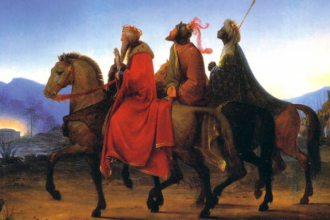Nayeli Riano
T.S. Eliot’s “The Journey of the Magi” is as sincere a conversion poem as one can have it: No fancy light shining down from the heavens or a thunderous call to holiness; just one small event that left a Magus perplexed by a new worldview that was unsettling and strange, for it put into question his previous passions and beliefs.
There is an idea that the best artists who have converted to Christianity sacrifice their creativity for spiritual relief. Regarding T.S. Eliot’s baptism and confirmation in the Anglican Church, Ezra Pound once remarked that he did not believe that Eliot had genuine “faith,” only that in his old age he had wanted to believe in something so badly that he did everything in accordance with religion to force it so. As Eliot’s poetry became more explicitly Christian and transcendent, his literary contemporaries grew divided over their feelings about the artistic quality of his poetry. It is certainly an interesting question: When the artist becomes admittedly Christian, he is now, presumably, starting to find solace over the many questions that remain unanswered regarding this difficult human experience. These are the very unanswered questions that we seek conversation about in art: For people, particularly non-religious, engaging with an artform in hopes of sensing similar questions about life, only to find that the artist resolves their frustration, sorrow, or anger, with Christ, may come off as too easy; a jump—or leap of faith—that the individual is not yet searching. It might even be a disappointment.
Eliot conveys that artistic middle ground that beckons faith without it emanating from his verses in a way that might put off new readers. In fact, I was always surprised to find within my English department an open love for Eliot’s poetry among faculty. Of course, they never mentioned neither his Christianity nor his conservative sympathies, » Read More
https://theimaginativeconservative.org/2025/01/death-yuletide-t-s-eliot-the-journey-of-the-magi-nayeli-riano.html






